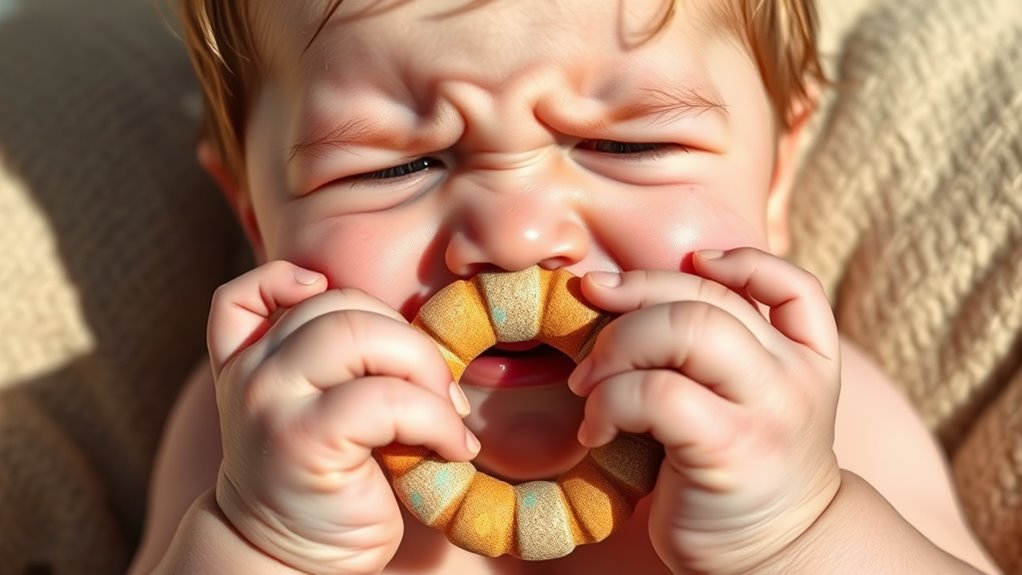Teething can be tough, but you can soothe your baby’s discomfort with cold teething rings or a chilled, damp cloth for gentle gum relief. Gently massaging gums, offering distraction, and ensuring safe, chemical-free toys help ease pain and fussiness. Remember to avoid hard or unsafe objects and watch for signs of severe discomfort. If you keep struggling, there are simple tips that can improve your experience—stay tuned to discover more effective ways to manage this phase.
Key Takeaways
- Use cold, safe teething toys or washcloths to numb gums and reduce swelling.
- Gently massage gums and offer distractions like singing or play to ease discomfort.
- Avoid household items like frozen spoons and ensure teething objects are chemical-free and safe.
- Monitor your baby for severe or prolonged pain, and consult a doctor if needed.
- Maintain routines, provide cuddles, and be patient as each tooth emerges to support healthy growth.

Are you feeling overwhelmed by your baby’s teething discomfort? It’s a common experience, and you’re not alone. As your little one’s dental development progresses, those tiny teeth begin to push through the gums, often causing pain, fussiness, and sleepless nights. Understanding what’s happening can help you feel more in control and better equipped to soothe your baby. Teething is a natural part of growth, but it doesn’t mean you have to suffer through it without strategies to ease the discomfort.
Teething can be tough, but understanding it helps you soothe your baby more effectively.
During this phase, your baby’s gums become swollen and tender as new teeth make their way to the surface. These changes can make chewing, drooling, and irritability more intense. To help, you’ll want to focus on effective soothing techniques that provide relief and comfort. Cold objects, like a chilled teething ring or a soft washcloth, can numb the gums and reduce swelling. Make sure the items are safe and free of any harmful chemicals or small parts. Gentle gum massage with a clean finger can also help, as it applies pressure that may ease some of the pain. Many babies respond well to distraction—playing, cuddling, or singing can shift their focus away from discomfort.
You might notice that your baby is more fussy or restless than usual. That’s normal, but it can be exhausting for parents. Offering a cold, wet cloth for your baby to chew on can provide immediate relief. Some parents find that over-the-counter remedies like teething gels can help, but you should always consult your pediatrician before use to ensure safety. Remember, your baby’s dental development is a process, and each tooth that comes in is a sign of growing health. Patience is key. Keep your baby comfortable by maintaining a routine, providing plenty of cuddles, and staying attentive to their cues.
Another soothing technique involves giving your baby a clean, chilled teething toy to gnaw on. These toys are designed specifically for teething comfort and can help massage sore gums. Avoid using household items like frozen spoons or hard foods, which might pose a choking hazard or cause damage to the delicate gums. If your baby’s teething pain seems severe or persists for an extended period, don’t hesitate to reach out to your healthcare provider for guidance. Sometimes, additional interventions or reassurance may be necessary, especially if teething disrupts sleep or causes excessive discomfort.
Frequently Asked Questions
When Should I Start Worrying About My Baby’s Teething Delays?
You might wonder when to worry about teething delays, but it’s normal for some babies to hit milestones at different times. Typically, the first tooth appears around 6 months, but delays can happen without concern. However, if your baby isn’t showing signs of teething by 12-14 months or if you notice other developmental delays, it’s best to consult your pediatrician. Trust your instincts and seek advice if you’re worried.
Are There Natural Remedies to Speed up Teething?
You’re wondering if natural remedies can speed up teething. While herbal remedies like chamomile or clove may offer some relief, there’s limited scientific evidence they accelerate teething. Focus on dietary adjustments, such as offering cold, soft foods or teething toys, to soothe discomfort. Always consult your pediatrician before trying herbal remedies, and remember that teething timing varies naturally. Patience and gentle care are your best tools during this stage.
How Can I Tell if My Baby’S Teething Pain Is Severe?
Think of your baby’s teething pain like a storm brewing—some signs to watch include persistent crying, swollen gums, or refusing to eat. If the pain intensity causes your little one to be inconsolable or if they develop a fever or diarrhea, it might be severe. Trust your instincts; intense discomfort isn’t normal, and consulting your pediatrician can help determine if additional relief is needed.
Can Teething Cause Other Health Issues Like Fevers or Diarrhea?
You might wonder if teething causes fevers or diarrhea, but teething myths suggest otherwise. Usually, teething doesn’t lead to high fevers or diarrhea; these signs could signal an illness. While teething can cause mild discomfort, it’s important to focus on teething nutrition and maintain good hygiene. If your baby develops a fever or diarrhea, consult a healthcare professional to rule out other health issues.
What Are the Best Nighttime Soothing Strategies for Teething Pain?
Imagine you’re guiding your little sailor through a stormy night. To calm their teething pain, gently massage their gums to soothe the rough seas and use calming sounds like lullabies or white noise to anchor them. These strategies help ease discomfort, making the night more peaceful, so both of you can rest. Consistency and gentle comfort are your compass, turning stormy nights into calm waters.
Conclusion
Remember, teething is a tough chapter, but it’s only a passing storm. With patience, gentle remedies, and a sprinkle of humor, you’ll navigate this phase like a seasoned sailor steering through choppy waters. Trust your instincts, stay calm, and know that brighter days are just around the corner. Before you know it, those tiny teeth will be shining like stars, and your little one will be smiling through the tears, stronger than ever.










